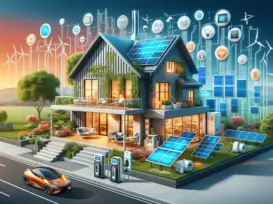Grus Home Energy - Smart Metering Systems
Revolutionizing Utility Management: The Advancements in Smart Metering Systems
Revolutionizing Utility Management: The Advancements in Smart Metering Systems
The landscape of utility management is undergoing a significant transformation, driven by the advent of smart metering systems. These sophisticated devices are a far cry from the traditional meters, which required manual reading to track the consumption of utilities such as electricity, water, and gas. With the integration of cutting-edge technology, smart metering systems are not only automating the measurement process but also providing a wealth of data that can lead to more efficient energy use, reduced costs, and enhanced service delivery.
Smart meters function by recording the consumption of utilities in real-time and transmitting this data back to the utility provider. This continuous flow of information offers several advantages. For one, it eliminates the need for estimated billing, which can often lead to inaccuracies and unexpected costs for consumers. Instead, billing can be based on actual usage, providing a transparent and fair charge for users. Additionally, consumers can monitor their own consumption patterns through user-friendly interfaces, empowering them to make informed decisions about their energy use and potentially lower their bills.
Another transformative aspect of smart metering is its role in supporting the integration of renewable energy sources into the grid. As the world moves towards a more sustainable future, balancing supply and demand becomes more complex. Smart meters can facilitate this by providing detailed data on energy consumption, which in turn can be used to optimize the generation and distribution of renewable energy. This not only aids in reducing greenhouse gas emissions but also ensures a more reliable and consistent supply of power.
Moreover, smart metering systems play a pivotal role in the development of smart grids, which are modernized electrical grids that use information and communication technology to gather and act upon information. This includes information about the behaviors of suppliers and consumers, in an automated fashion to improve the efficiency, reliability, and sustainability of the production and distribution of electricity. Smart meters serve as the foundational building blocks of these grids, offering the real-time data needed to manage network loads effectively.
The potential benefits of smart metering systems extend beyond consumer-level advantages to encompass the larger goals of energy conservation and environmental protection. By enabling more precise control over energy distribution, these systems can significantly reduce wastage. For instance, during off-peak hours when demand is low, utilities can decrease production, therefore minimizing the unnecessary generation of power. This level of control can contribute significantly to the fight against climate change, as it leads to a reduction in the carbon footprint of utility companies.
However, the deployment of smart metering systems is not without its challenges. Concerns over data privacy and security have been raised, given that meters handle sensitive information about individual usage patterns. It is crucial for utility companies to invest in robust cybersecurity measures to protect consumer data and gain public trust. Additionally, the cost of implementing these systems can be substantial, and there needs to be a clear framework for cost recovery to ensure that the transition is economically viable for both providers and consumers.
In conclusion, smart metering systems represent a critical step forward in modernizing utility management and fostering a more sustainable and efficient use of resources. They offer an array of benefits that include accurate billing, consumer empowerment, the facilitation of renewable energy, and the foundation for smart grids. As the technology continues to evolve and as stakeholders address the associated challenges, smart metering systems stand poised to redefine our approach to managing utilities in the 21st century.
Blog, Smart Home Automation , February 17, 2024 , Electric Vehicle (EV) Charging, Energy Consumption Analysis, Energy Management, Energy Savings and Profit, Heat Pumps Optimization, Home Battery Storage, Renewable Energy Technologies, Smart Grid Technology, Smart Metering, Smart Metering Systems, Solar Panels Efficiency, Sustainability in Home Energy
©2025 All Rights Reserved. Grus IoT Co.,Ltd.
